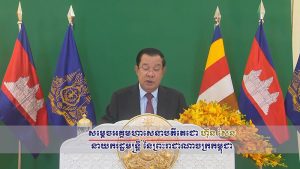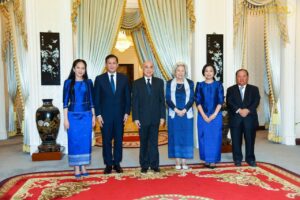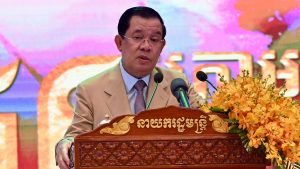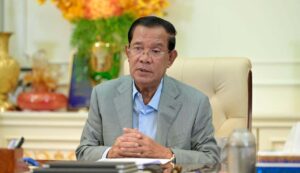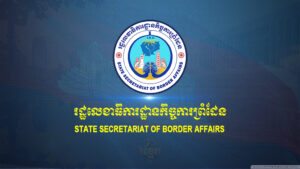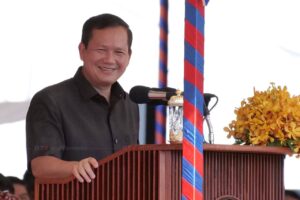HE Kitti Tesaphibal Bindit Hun Manet, Prime Minister of the Kingdom of Cambodia, meets 18,000 factory workers in Prey Speu, Por Senchey District, Phnom Penh [Unofficial translation]
![HE Kitti Tesaphibal Bindit Hun Manet, Prime Minister of the Kingdom of Cambodia, meets 18,000 factory workers in Prey Speu, Por Senchey District, Phnom Penh [Unofficial translation]](https://grandnewsasia.com/app/uploads/2023/08/photo_2023-08-29_09-23-19.jpg) HE Kitti Tesaphibal Bindit Hun Manet, Prime Minister of the Kingdom of Cambodia, meets 18,000 factory workers in Prey Speu, Por Senchey District, Phnom Penh [Unofficial translation]
HE Kitti Tesaphibal Bindit Hun Manet, Prime Minister of the Kingdom of Cambodia, meets 18,000 factory workers in Prey Speu, Por Senchey District, Phnom Penh [Unofficial translation]
(1) Achievements realized in the past four consecutive decades
[…] HE Heng Sour and I would like to express our gratitude and appreciation to Samdech Techo for his efforts to lead the country so far. I would thank the leadership of the Ministry of Labor for leading works in the past (and) that today His Excellency Ith Sam Heng also attended the event. Started by HE Vong Sot, the work was later carried through by HE Ith Sam Heng. The achievements we have today do not happen overnight. We have scored them consecutively in the past 4 decades. After the country was divided, we have overcome many difficulties to end the war, liberating the people from the abyss of death, and today, we sit in this field […] surrounded by factory that provides jobs worth tens of millions of salaries into people’s pockets […]
(2) The large-scale gathering before the election, the first forum to meet as the Prime Minister
There are memories about this place. I have no way of knowing if it is a coincidence or a temperament. This is the last place where I met almost 20,000 workers before the election. Now it is the place where I first started a forum to meet people in my role of Prime Minister […] this is not only (a meeting place where I met) a lot of people, but I remember (two events) […] there was a young man sitting right there and said to me, “Brother, I could not sleep last night as I knew I would see you today …” and secondly, this is the place that (I have received) the most kisses (on) June 25 (2023) […]
(3) To thank and confirm new government’s commitment to score achievements for the people
Today’s meeting (has) two purposes. The first purpose is to thank (people, brothers, workers), and another purpose is to confirm the commitment of the new government to continue to score achievements for the people […] in the field of labor as well as in family. What does the Royal Government do for us? We work to serve the nation. What is the basis of the nation? It is the people. In order for the nation to be strong, the nation to prosper, the nation must maintain internal unity, and the people must be kept strong […] employees and employers as well relevant sectors have collaborated to fulfil tasks, build themselves, build on the achievements they have realized, participate in the garment industry and all industries to boost our national economy together […]
(4) Peace was important 40 years ago, is now and will be 100 years to come
[…] The political platform of the Royal Government led by the Cambodian People’s Party […] is to maintain the achievements of the Cambodian People’s Party scored in the past 44 years, whereas the most important of all is to maintain peace, stability and promote the development for the people and the national territorial unity, which must be maintained. Some people say that Hun Manet keeps saying the same thing over and over again […] (yes, it is because) that same thing is important. Peace was important 40 years ago, 20 years ago and is still important today, and will be more important for Cambodia 100 years to come […]
(5) RGC’s Political platform developed by experts of dozens of years of experiences
The political platform of the Cambodian People’s Party is not made by one or two people by sitting down reading speeches or reading research papers and analyzing. It is made by a team of experts with decades of experience leading policy and implementation. Thus, the policies of the Royal Government led by the Cambodian People’s Party are clear and long-lasting […] if you have not been in charge of policy planning and implementation, you may not be qualified to evaluate and demean policy makers who have been successful for decades. Let me state it as simple as that […]
(6) Readjust, reformat, sharpen angles, more policy priorities, ensure competitiveness and long-term development
[…] This pentagonal policy sets out the (motto) of job, growth, equity, efficiency and sustainability (to provide) additional achievements for the people […] why do we continue the CPP policy that has been put in place? This does not mean that we take the pre-existing policy completely. We take it as a foundation. We readjust, reformat, and sharpen angles, and give more attention to policies priority. Rectangular strategy, for example, has not got technology. Now that Cambodia is entering the stage of modern technology, we have to ensure that the country obtained competitiveness and long-term development […] we need to define more key priorities. Before we had people, roads, water, electricity. Now we have the same four plus one – technology, so that we, our people, can get modernization […] in order to produce, we need our people to be more modern and strengthen technology. We will not stay idle. Our policies are stable, but we are ensuring that the people’s benefits are lively. In simple term we would say this policy “works” […]
(7) Sharpening and ensuring efficiency of triangular and rectangular strategies
[…] The policy that we have set out for the last 20 years, from the triangular to the rectangular strategy, has worked (well). If it works, do we have to give it up? No. We need to keep sharpening it so that it works more efficiently. Hence is the pentagonal strategy. What does the policy mean? The policy works means that it provides for the growth of the national economy and reduces poverty. Our national economic growth has been quite rapid since the war ended in 1998. Talking about poverty reduction, where the rate of poverty among the population was 60% in 2000, in 2020, we had brought it down to 17.20% […] whereas the living standard of our people has improved, and hence on the country has evolved from one of the poor countries to a lower middle-income country […]
(8) 2018 to 2023, free treatment of 13 million cases, cost about 376 million dollars
Now, on the health issues, between 2018 and 2023, (a period) 5 years, our brother and sisters (workers) started to get medical checkups and treatment free of charges. There were in all more than 13 million cases nationwide […] this means that some thirteen million workers/employees went for health check-ups or medical treatment jointly paid by the state and employer […] or worth about US$ 376 million in budget. The state and the private sector have helped you to have to make no payment […]
(9) Covid-19 either kills healthily or with starvation
Many asked why the workers were not allowed to take time off (during the Covid-19 period). Let me tell you, brothers and sisters, Covid-19 would kill us on two fronts. First, it would kill us in terms of health, and second, it would starve us too. If our economy did not work, you would have a hard time. If we suspended works then, all factories would have moved to another country. There would not be orders made to our country. What works would you have left? […]
(10) Prioritize people’s lives and ensure there is rice for people’s cooking pots
Samdech Techo, at that time, made difficult decisions to protect the lives of our people by purchasing vaccines, taking measures, and sometimes we had to order lockouts, on the one hand, and on the other, keep the economic chain going […] if the 800,000 jobs in the labor sector were not there anymore, how would we go about feeding them? On the one hand, we used our saving to buy vaccine and medicines. We do not know when it will end? Will it be big again or not? We must prioritize the lives of the people […] we must do everything we could to ensure that the people’s cooking pots have got rice to cook and people do not starve […]
(11) 82.30% voters or some 6 million voted to support the CPP political platform
How do we set the policy right? Let us look at the election results. Each election is when the people rate the achievements that each government has provided for them or the country. Some 84.59% people went to the polls and 82.30% or between 6 million and 7 million people voted for the CPP. This means that they are happy with the results of the policies that we have put in place […] thus, emphasizing that (the CPP) political platform did create achievements for the people, increase the economic vibrance, and that we do not force it upon the people […]
The people’s voice expressed through this election confirms that the people are happy with the CPP and support the long-term plans and vision of the CPP leadership in providing opportunities and promote the leadership of this new (leading) group […] they have to respect the rights of the 8.2 million people who went to the polls and they had to respect the rights and will of the 6 million people who voted for the CPP […] that is the true election and constitutional democracy based on law and the people […]
(12) Engaging with countries in the spirit of independence based on law and national interests
It is said that this government was born without the support of the international community, and only a few dictatorial countries send messages of support. To send or not to send a congratulatory letter is not an obligation of each country. It is just a sentiment. If they remove the diplomats, they will not work with us […] we are friendly with all countries in the world, either in the liberal or the communist bloc. We are neutral. We communicate with all countries in the spirit of independence based on laws and our national interests […]
I now form the spokesperson of the Prime Minister under the Cabinet. Whoever wants to quarrel with me, wait a little longer, and they can quarrel with my spokesperson […] should he adhere to his quarrel making line. I have no time to argue. My time is with the people. My time is for leading the meeting of the Royal Government. I might make some remarks once in a while […] I have a lot of works to do and only 24 hours a day […]
(13) Not a revolution but a development
Some asked whether to change or not? We are not a revolution. We develop. Use that word clearly. Revolution means to come up and change everything. We reform to be sharper. We develop. We develop the right policies and products for the people, because the people have already sent a message of what they want. I wholeheartedly support the policies that have been made in the past […] I am sending a message to those who are preparing to protest against me. I do not oppose your rights, but please respect the US law, do not violate the law, and do not do anything that will affect those who come to support the government, because there are hundreds of thousands of people who will show supports to the RGC. Do not do anything that will cause conflict between the supporters and the opponents. We have different political tendency, but do not quarrel, do not go to fight in America […]
(14) US legislature and executive power meet with “Prime Minister Hun Manet”
(The opposition say that they will) gather people (for a demonstration) so that the UN does not recognize (Prime Minister Hun Manet) […] on the remark that the United States does not issue me a visa, I would like to confirm that firstly, I am going to go to the United Nations, and secondly, to answer this question whether the US government recognize this government (of Cambodia) or not, last night, I met the Americans delegations for 2 hours. They are not ordinary Americans. It is a U.S. congressional delegation – with representative from the Democratic and Republican, and the U.S. government representative, who is the US ambassador here. Both the US Legislature and the US executive power came to see me. Meet me in what name? Upon leaving the meeting, the US Embassy webpage posted a message saying “this evening, the US delegation met with Prime Minister Hun Manet” […]
(15) To set up an information and intervention team
Soon I will form up a team. The first group that I am going to form is a press group to collect daily news for me. Also, I will form another intervention team in my cabinet. The special intervention team with deal with works. They are not taking over works from the provincial authority (but) to help monitor the implementation and seek the solution […] I only have 24 hours. Should I spend the 24 hours I have to think of responses to the attack, or to build new mechanism to serve the people, listen to the people on social media, to resolve problem, and each minister fulfilling his/her work. I say taking the time to serve the people is better than taking the time to listen to (attacks). If s/he is happy to burn himself with anger, s/he may go one […] be careful – “more anger, less sleep” would be quite lethal […]
(16) Six policies of priority must be implemented immediately
Firstly, strengthening health care services to reach the target population of 9 million people making it a global health coverage. This is the first priority action goal that we need to set out through the first two mechanisms – (1) the Health Equity Fund to support health care, to help 500,000 vulnerable and at-risk families with 1.8 million members […] and (2) the expansion of National Social Security Fund (NSSF) coverage to some 3 million people in the burden of workers through voluntary contributions. What does that mean? As of present we have NSSF coverage for the workers, but their children are not covered. Now we have the option that should they pay an additional contribution of 15,600 Riel per month, their whole family members would be covered too […];
Secondly, we train skills for 1.5 million young people from poor families… they will learn skills as there are going to be short courses, medium courses, long courses, and we think that some 2% to 4% of this total number will have the chance to study what we call the Ancestorial skills legacy […]
Thirdly, to expand the coverage of the National Social Assistance Program and the Social Protection Framework to about 4.5 million people […] first – to provide subsidies to more than 70,000 poor and vulnerable families, a total of more than 2.8 million people. This policy is to invest in the people […] from which people benefit themselves and our national economy; second – a part from saving, people use the money to buy food and utensils […] which would then drive the economy […]; and – to expand the social protection framework to respond to disasters to provide systematic sustainable support to the people […]
Fourthly, our action will take into consideration not only those in the formal enterprise, the registered companies, but also those working in the informal or unregistered enterprises, and this is the main priority goal that Samdech Techo set in the sixth term […]
Fifthly, set out a specific budget package to support the agricultural sector. Our people work not only in the tourism industry or in banking or finance, but in agriculture and we need to offer them help […]
Sixthly, it is planned to deploy agricultural officials in all communes across the country with priority on the agricultural sector […] we are to deploy (agricultural extension workers) in the provinces, communes, and sangkats where there is a need […] I would urge a clear selection, not to recruit a civil engineer for agricultural work […] we have got many agricultural students for that purpose […]
(17) Promoting Research and Development (R&D)
Our new incentive system that we are going to develop focuses on the necessary professional frameworks at the ministry/institution level. For example, in a ministry, the main framework is the brain. People who put together a plan. But this job is a bit hard. Many would transfer out. The new policy, on this note, has to deliver budget to support policymakers. I have talked on various occasions about R&D when I was a Prime Minister candidate […] soon, we will also have to increase researchers in history because if we do not write history, other countries will do for us […]
I encourage this effort […] about R&D and other technological innovations, I have on occasions talked to/with HE Hang Chuon Naron (Deputy Prime Minister and Minister of Education, Youth and Sports), HE Hem Vandy (Minister of Industry, Science, Technology and Innovation), and HE Aun Porn Moniroth (Deputy Prime Minister and Minister of Economy and Finance) in terms of policy framework with higher education institutions, and I suggest that we look at the possibility of establishing R&D centers that I think we should give priority to some colleges rather than we create it in some other place […]
(18) Six specific tasks of the Ministry of Labor in 2023
Therefore, while launching this policy, I would like to entrust the specific tasks to the Ministry of Labor to do […] this policy has been in debate for decades, and it is not happening as I am holding a microphone to read it to all. The Cambodian People’s Party does not talk much but does the job. We rule, we lead our country, we cannot lie. We dare to speak, we dare to do, we dare to take responsibility […]
The assignments for the Ministry of Labor in the remaining part of 2023 are – firstly, to make good efforts to facilitate the discussion of the minimum wage based on the scientific calculation and criteria set out in the law on the minimum wage (and to achieve it) before the Pchum Ben holiday […]
Secondly, to prepare urgent legal documents for the speedy implementation of the national social security system for health care and voluntary contribution regime for those members of the National Social Security Fund to help ease the burden of health care costs of workers […]
Thirdly, to launch vocational training programs in this term for 1,500,000 young people and youth with disabilities from poor and vulnerable families, and coordinate with stakeholders to allow workers to learn vocational skills to increase (knowledge) […]
Fourthly, to promote full implementation of apprenticeship training obligations in accordance with the Labor Law, including internship programs, skills development programs and skills reorganization, by encouraging the private sector to participate in the training of new workers and employees, while providing training for workers on the job to improve skills, increase productivity and the ability to increase wages […]
Fifthly, to pay attention to better implement the cash support program for pregnant women, which we have both before, during and after childbirth, […] and guarantee leaving workplace fifteen minutes before off-hour to pregnant women and people with disabilities […]
Sixthly, to create a competition program on the theme “Harmony in the workplace to turn an enterprise into a peaceful community from 2024 onwards.”
(19) Four tasks for the Ministry of Labor and Vocational Training in the next 2 years
Above, I have listed out the six points that need to be done in 2023. Now in two years, the Ministry of Labor shall:
Firstly, cooperate with the Ministry of Women’s Affairs, the Ministry of Education, Youth and Sports, representatives of employers and workers ‘representatives, to jointly study the feasibility of establishing community nurseries and kindergartens in factory areas to help employees’ children […];
Secondly, cooperate with stakeholders to improve the cafeteria or canteen in the factory in operation suitable for the employee program and require the establishment of cafeteria or canteen […];
Thirdly, cooperate with stakeholders to study mechanisms to support and encourage gradual change in the means of transporting workers in accordance with technical and comfort standards by 2027. We find solutions that help ensure the safety of your transportation […]; and
Fourthly, promote the skills recognition test program, which is an opportunity for all workers to work both in formal and informal system to gain a certification of skills to prove their expertise […]./.

